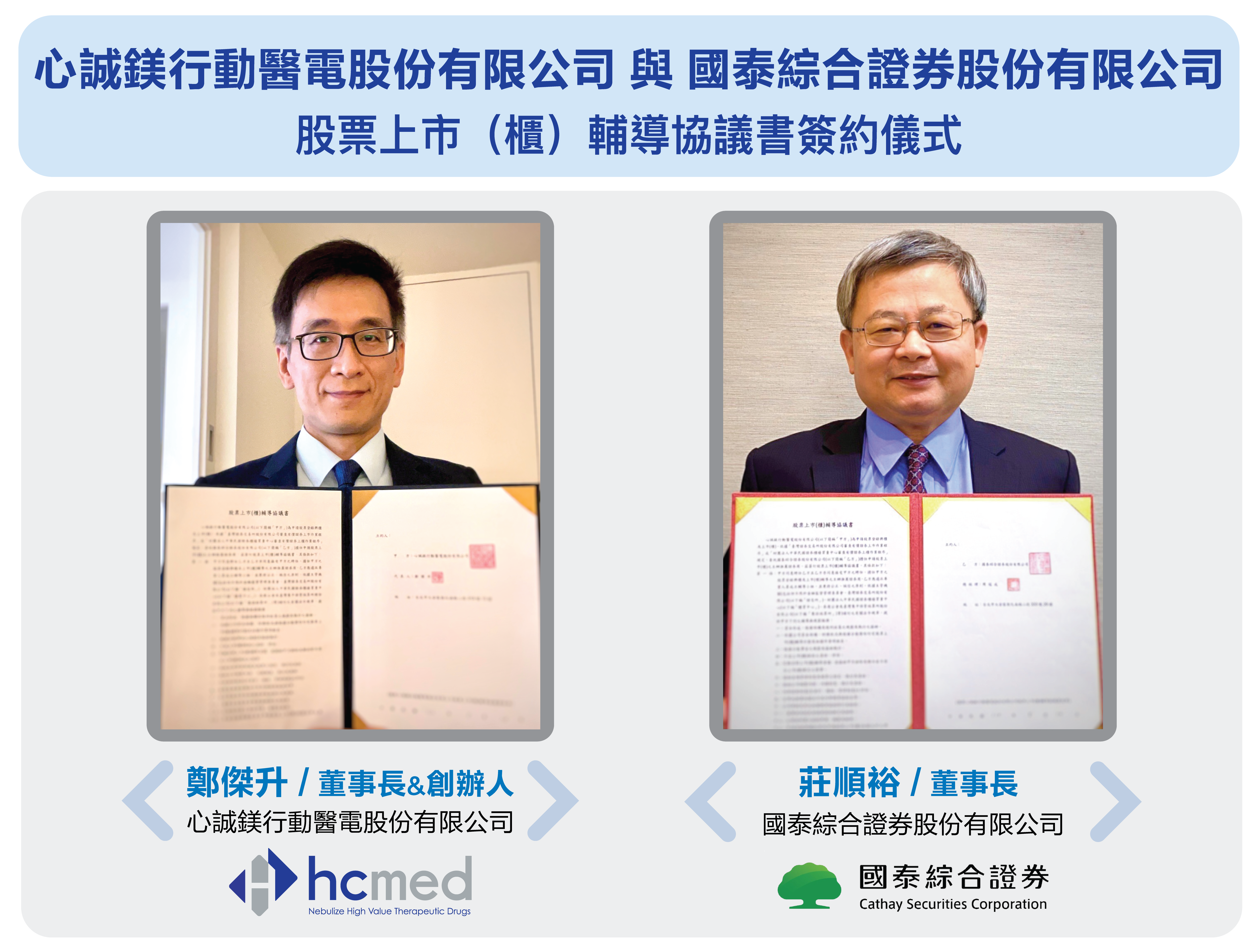2021
Jun
25
News
HCmed Signs Agreement With Cathay For IPO
HCmed Innovations (HCmed) signed an agreement with Cathay Securities on June 21st, 2021, to prepare for its initial public offering (IPO).
"Taiwanese people have been battling an increase in respiratory conditions for a long time, not to mention the recent COVID-19 outbreak that has brought additional pressure. The pandemic has not only affected Taiwan, but has also brought serious effects to the entire world, ” stated Cathay Securities. “Whether we talk about inhaled vaccines or treatments for lung injuries, inhalation therapy continues to be greatly valued in the clinical."
"While being highly recognized for its capabilities to develop and manufacture vibrating mesh nebulizers, HCmed is always prompt to provide innovative solutions to fulfill the demands of a constantly evolving inhalation therapy field,” said Cathay Securities. “With Taiwan’s capital market as a steppingstone, we hope to introduce Taiwan’s high-quality mesh nebulizers to the global medical market."
Founded in 2014, HCmed focuses on the development and manufacturing of drug-device combination products for inhalation therapy. The company is venture-backed with funding from Vivo Capital and other major investors from the US, Taiwan, and Japan. With the completion of the development of its first-generation nebulizers in less than 2 years, its medical devices have successfully received several regulatory approvals, such as European CE, Taiwan TFDA, Brazilian Anvisa, Indonesian Badan POM and China NMPA. HCmed’s mesh nebulizers are currently available in Brazil and China.
HCmed has signed a global development agreement with global biotherapeutics leader CSL Behring to collaboratively develop plasma derived immunoglobulin administered via HCmed’s new generation vibrating-mesh nebulizing device. While co-developing a formulation that generates sales of more than USD 4 billion annually, HCmed is expected to make contributions to the Contract Development and Manufacturing Organization (CDMO) market growth for inhalation therapy in Taiwan. Once the combination product is available on the market, HCmed is expected to receive device revenue and royalties from sales of the product. This strategic partnership is also expected to help HCmed become a leading CDMO company in the respiratory treatment field.
"We are optimistic about HCmed’s future potential”, said Cathay Securities. “We are driven by our promise to assist outstanding companies in entering Taiwan’s capital market and to provide shareholders with good investment options.”
Chronic lower respiratory diseases have become one of the top ten causes of death in Taiwan. The vibrating mesh nebulizers developed by HCmed offer patients with easy-to-use devices to nebulize different types of medication, ranging from small molecule synthetics to large molecule biologics. Moreover, HCmed’s patented technology contributes to the efficient delivery of liquid medication, transforming it into fine aerosol. This process generates droplets between 3-5 um in diameter, facilitating drug delivery with deep lung deposition and making it easier for patients to receive treatment without reinforcing usage of specific breathing patterns.

"Taiwanese people have been battling an increase in respiratory conditions for a long time, not to mention the recent COVID-19 outbreak that has brought additional pressure. The pandemic has not only affected Taiwan, but has also brought serious effects to the entire world, ” stated Cathay Securities. “Whether we talk about inhaled vaccines or treatments for lung injuries, inhalation therapy continues to be greatly valued in the clinical."
"While being highly recognized for its capabilities to develop and manufacture vibrating mesh nebulizers, HCmed is always prompt to provide innovative solutions to fulfill the demands of a constantly evolving inhalation therapy field,” said Cathay Securities. “With Taiwan’s capital market as a steppingstone, we hope to introduce Taiwan’s high-quality mesh nebulizers to the global medical market."
Founded in 2014, HCmed focuses on the development and manufacturing of drug-device combination products for inhalation therapy. The company is venture-backed with funding from Vivo Capital and other major investors from the US, Taiwan, and Japan. With the completion of the development of its first-generation nebulizers in less than 2 years, its medical devices have successfully received several regulatory approvals, such as European CE, Taiwan TFDA, Brazilian Anvisa, Indonesian Badan POM and China NMPA. HCmed’s mesh nebulizers are currently available in Brazil and China.
HCmed has signed a global development agreement with global biotherapeutics leader CSL Behring to collaboratively develop plasma derived immunoglobulin administered via HCmed’s new generation vibrating-mesh nebulizing device. While co-developing a formulation that generates sales of more than USD 4 billion annually, HCmed is expected to make contributions to the Contract Development and Manufacturing Organization (CDMO) market growth for inhalation therapy in Taiwan. Once the combination product is available on the market, HCmed is expected to receive device revenue and royalties from sales of the product. This strategic partnership is also expected to help HCmed become a leading CDMO company in the respiratory treatment field.
"We are optimistic about HCmed’s future potential”, said Cathay Securities. “We are driven by our promise to assist outstanding companies in entering Taiwan’s capital market and to provide shareholders with good investment options.”
Chronic lower respiratory diseases have become one of the top ten causes of death in Taiwan. The vibrating mesh nebulizers developed by HCmed offer patients with easy-to-use devices to nebulize different types of medication, ranging from small molecule synthetics to large molecule biologics. Moreover, HCmed’s patented technology contributes to the efficient delivery of liquid medication, transforming it into fine aerosol. This process generates droplets between 3-5 um in diameter, facilitating drug delivery with deep lung deposition and making it easier for patients to receive treatment without reinforcing usage of specific breathing patterns.


